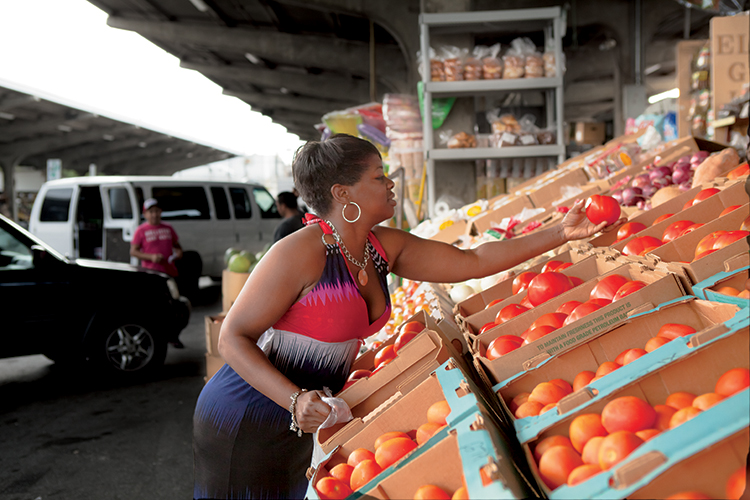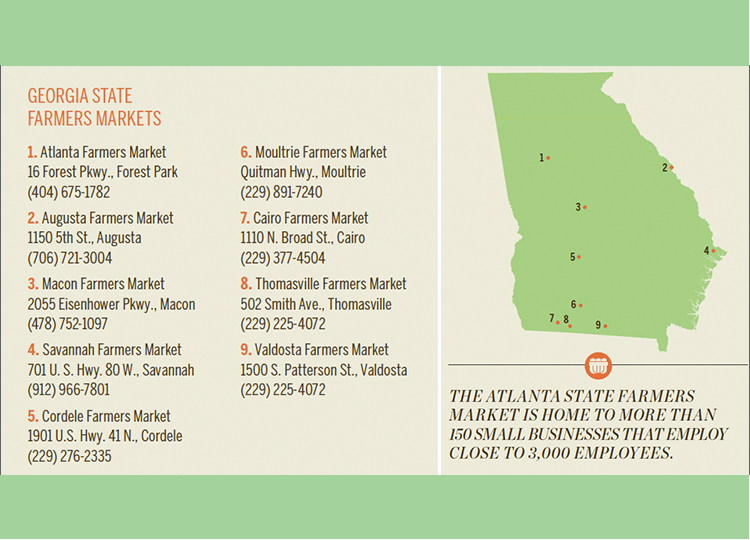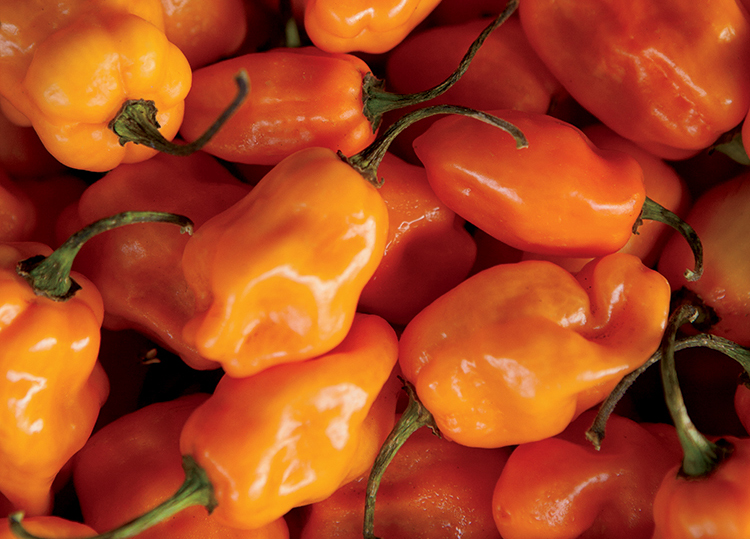Home > Georgia > Georgia Farm to Table > To Market We Grow at the Atlanta State Farmers Market
To Market We Grow at the Atlanta State Farmers Market

The Atlanta State Farmers Market is an impressive tribute to the bounty of farms throughout the Southeast, with stall after stall piled high with fresh fruits and vegetables.
“What began as a small farmers market more than 50 years ago has evolved into the largest wholesale terminal fruit and vegetable market in the Southeast,” says Paul Thompson, market manager.
The market stretches across 160 acres – that’s the equivalent of 112 football fields – and welcomes visitors from Atlanta and beyond 365 days a year with a delicious display of regionally grown foods, from fresh Georgia blueberries in late spring and summer to fall pecans just in time for holiday pies.
The market features between 40 and 50 wholesale vendors, 55 year-round tenants, a garden center with 10 vendors and two restaurants. All these combined, the market provides close to 3,000 jobs. It hosts growers and producers from across the Southeast and is considered one of the largest markets of its kind in the world.
“The Atlanta State Farmers Market serves a variety of consumers from big-box retailers, grocery stores and restaurants, all the way to your local fruit stand,” Thompson says. “If you’ve eaten in a restaurant in or around Atlanta, chances are some of the products passed through the Atlanta market. Customers can buy fruits and vegetables from the farmer, plants and garden supplies in our garden center, as well as conventional and organic produce, meats and dairy from the larger vendors. Our farmers market offers a unique experience that cannot be found anywhere else.”
More than just an experience, the market is a significant driver for Georgia’s economy. Almost $1 billion worth of produce passes through the market each year, and in the 2014 fiscal year, the market brought in more than $7 million in state revenue.
Rooted in Success
The market opened its doors in 1959 with a handful of vendors that included Sutherland’s Foodservice, a family-owned and operated food wholesaler.
Sutherland’s distributes Georgia-grown vegetables and meats to restaurants, bakeries, state facilities, schools, day cares, universities, health care facilities, correctional institutions and retail operators. The 67-year-old company has operated from the farmers market since the market’s inception.
“Being part of the Atlanta Farmers Market allows us to be part of the growth and movement the Georgia Department of Agriculture continues to have. We live in Georgia, and we need to support the farmers and products that this state produces,” says Chelsea Glass, marketing coordinator for Sutherland Foodservice. “We also need to give that knowledge to kids growing up. We love having field trips come to the farmers market and are happy to give them a tour of our facilities. Kids these days need to be aware of where they live and how the farmers market and the Georgia Department of Agriculture contribute to the great state we live in.”
Destiny Organics has also been with the market since its creation in 2001. The company is the premier certified organic distributor of Georgia. They work with local farmers and producers – including more than a dozen Georgia Grown members – to connect them with the consumer, aiming to be the “to” in farm-totable. As for their presence at the market, General Manager Diana Earwood says it was a logical step.

“Where else can you be centrally located to all the major interstates and airport?” she says. “Plus, we really appreciate the relationship forged between other vendors, the Department of Agriculture and Clayton County.”
She adds that the amount of meats, dairy and produce – whether fresh, frozen, refrigerated or dry – that moves through the market is astonishing. She cites Destiny partner producers Vidalia Valley, Hunter Cattle Co. and more as successful examples of the market’s vendors.
Another longtime vendor is Collins Brothers Produce. The company began selling fruits and vegetables from the back of a truck, and now supplies fresh fruits and vegetables, exotic fruits, milk and egg products to grocery stores throughout the Southeast.
Thompson says companies like Destiny Organics, Collins, Sutherland’s and J.J. Jardinia Co., which all began as small retailers and grew over the years to major wholesale distributors, exemplify the mission of the Department of Agriculture.
“Ultimately, we’re trying to help people get into the market,” he says.





[…] farmflavor.com/georgia/georgia-farm… […]